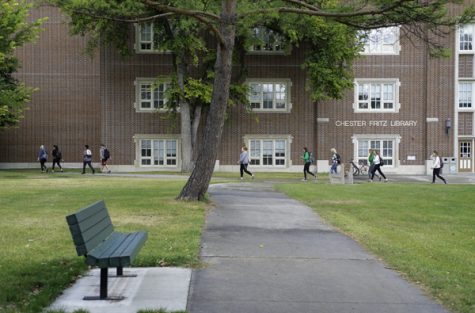Second languages should be mandatory
Early immersion-based learning of a second language is key for lifelong fluency and language comprehension.
October 8, 2017
Bonjour! Hola! Kon’nichiwa! Ciao! Do you ever wish you knew another language? And I mean more than just how to say hello in that language or count to ten. Being able to actually fluently speak in a foreign language can be very helpful in a lot of ways.
First off, it looks really good on your resume. This will allow you to have more opportunities in the future simply by having the ability to hold a conversation in Chinese. Also, there are a lot of skills associated with knowing a second language. According to the Center for Advanced Research on Language Acquisition, students learn other skills such as divergent thinking, pattern recognition and problem solving. This is especially prominent when learning a language from a young age.
Only 26 percent of Americans can hold a conversation in a language other than English, according to Gallup News. Spanish is the most common with nearly 50 percent, followed by French with 17 percent and German with only ten percent.
I’ve talked to a lot of people who wish more than anything that they knew a second language as well or at least almost as well as their first. No one complains about not knowing math and English well enough because those classes are already ingrained into the education system. You have to learn those skills whether you like it or not. Language is usually an elective you have to choose to keep taking. Or sometimes the problem is there can be lower quality teaching of the language or maybe if you’re from a small school, there’s not very many options for language learning. I think our education system needs to rethink how they teach languages. Though I will say we are getting better because according to Gallup News, 43 percent of Americans ages 18 to 29 can speak in a second language while only 15 percent of Americans ages 65 and older can.
Also, the older you get, the more difficult it is to learn a whole new language. Your brain is most ready to learn language when you’re young because you’re still learning your first language. This is why I think that language immersion elementary schools should be more common. It doesn’t even matter all that much what language because the simple idea of learning a second language is so valuable in itself because of the cognitive skills that go with it.
I was lucky enough to have gone to a French immersion school from kindergarten to fifth grade. I learned everything in French for six years. I could speak fluent French. And besides learning the language, we learned better how to problem solve. We would have to figure stuff out on our own a lot simply because we couldn’t fully understand the teacher yet because she was speaking in French.
I think immersion is the best way to learn a language. Anyone will tell you that the best way to fully know a language fluently is to immerse yourself in the culture so that you have to learn the language to survive there.
Jill Morton is a staff writer for Dakota Student. She can be reached at [email protected]






